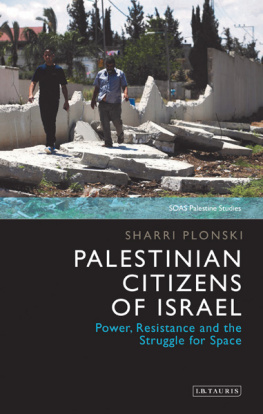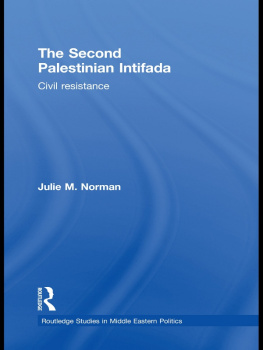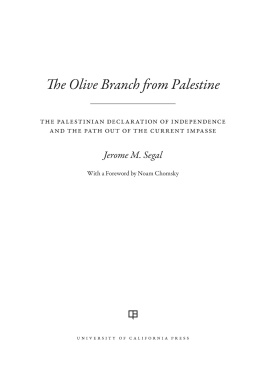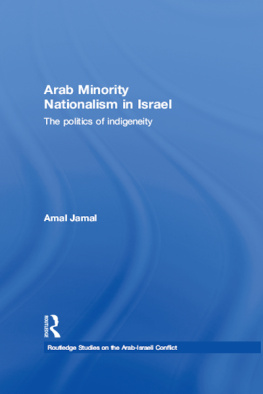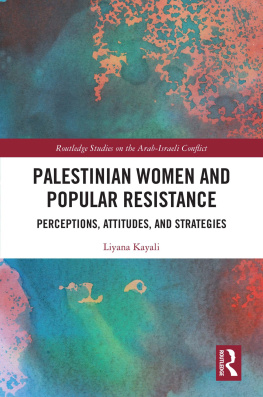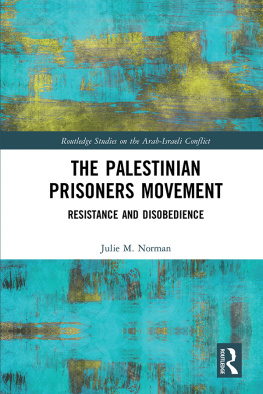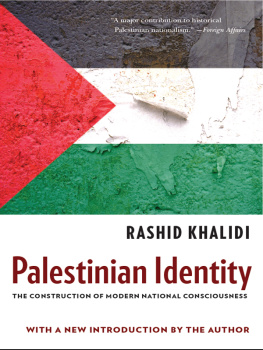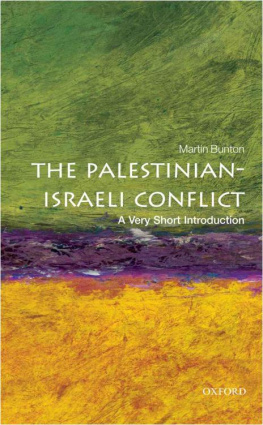
Sharri Plonski is a part-time lecturer and researcher with the Department of Development Studies and the London Middle East Institute at SOAS, University of London.
This is a perceptive, powerful, and highly readable account of the struggles of Palestinian citizens in Israel. Its fascinating insights across a wide-ranging array of case studies are framed by a sophisticated theoretical approach to borders, space, and resistance. An invaluable contribution to understanding how power works in Israel, and most importantly how it is contested.
Adam Hanieh, Reader in Development Studies, SOAS
This book is an excellent study of the spatio-politics of Palestinian citizens in Israel. It offers an in-depth ethnographic investigation and critical analysis not only of Israels policies of social, spatial and cultural control over its Palestinian citizens, but also of their politics of protest and their social agency. Framed within the settler colonial paradigm, this book conceptualises the creation and preservation of ethnic divisions: powerful groups, often linked to the state are able to plan the territory so as to exclude and segregate minorities. In such a process, as the book demonstrates well, the new geographies of exclusion work to essentialise both collective identities and the hierarchies of citizenship. Throughout the book a theoretical discussion leads to our understanding of the ways in which the making of space is inseparable from the on-going contestation within settler colonial societies, and that in this context, planning, land and development policies, despite their common representation as technocratic or neutral, are central tools with which dominant ethnic groups work to preserve its urban dominance.
Haim Yacobi, Professor of Development Planning, The Bartlett Development Planning Unit, University College London
SOAS PALESTINE STUDIES
This book series aims at promoting innovative research in the study of Palestine, Palestinians and the IsraelPalestine conflict as a crucial component of Middle Eastern and world politics. The first ever Western academic series entirely dedicated to this topic, SOAS Palestine Studies draws from a variety of disciplinary fields, including history, politics, media, visual arts, social anthropology, and development studies. The series is published under the academic direction of the Centre for Palestine Studies (CPS) at the London Middle East Institute (LMEI) of SOAS, University of London.
Series Editor:
Gilbert Achcar, Professor of Development Studies and International Relations at SOAS, Chair of the Centre for Palestine Studies
Board Advisor:
Hassan Hakimian, Director of the London Middle East Institute at SOAS
Current and Forthcoming Titles:
Palestine Ltd.: Neoliberalism and Nationalism in the Occupied Territory, Toufic Haddad
Palestinian Literature in Exile: Gender, Aesthetics and Resistance in the Short Story, Joseph R. Farag
Palestinian Citizens of Israel: Power, Resistance and the Struggle for Space, Sharri Plonski
PALESTINIAN CITIZENS OF ISRAEL
Power, Resistance and the Struggle for Space
S HARRI P LONSKI


Centre for Palestine Studies
Published in association with the Centre for Palestine Studies, London Middle East Institute
Published in 2018 by
I.B.Tauris & Co. Ltd
London New York
www.ibtauris.com
Copyright 2018 Sharri Plonski
The right of Sharri Plonski to be identified as the author of this work has been asserted by the author in accordance with the Copyright, Designs and Patents Act 1988.
All rights reserved. Except for brief quotations in a review, this book, or any part thereof, may not be reproduced, stored in or introduced into a retrieval system, or transmitted, in any form or by any means, electronic, mechanical, photocopying, recording or otherwise, without the prior written permission of the publisher.
Every attempt has been made to gain permission for the use of the images in this book. Any omissions will be rectified in future editions.
References to websites were correct at the time of writing.
SOAS Series on Palestine Studies 3
ISBN: 978 1 78453 656 5
eISBN: 978 1 78672 122 8
ePDF: 978 1 78673 122 7
A full CIP record for this book is available from the British Library
A full CIP record is available from the Library of Congress
Library of Congress Catalog Card Number: available
For Maya
CONTENTS
LIST OF ILLUSTRATIONS
Maps
Spaces/Cases of Palestinian-Citizen Unruly Politics.
The Bifurcation of Space: Mapping Spatial Apartheids.
Erasing Palestinian Ajami: Map of Evictions and Demolitions, Ajami Neighbourhood, Jaffa-Tel Aviv.
Re-mapping Palestinian Ajami: Seeing Ajami through the lens of Sami Abu Shehadehs Political Tour.
The Palestinian Borderlands: Mapping the Galilee as Arab Space.
The Skewed Lines: Mapping Jurisdictions and Statistics in the Central Galilee.
Jewish Space and the Colonial (B)Order: Map of the Misgav Regional Council.
The Alternative Map: Mapping the Unrecognised Bedouin-Arab Villages of the Naqab.
Marking the Enclosure: Addendum to the Draft Law.
The Official Space: The Prawer Plan for Transfer.
The Alternative Space: A Regional Strategy, from the Alternative Master Plan
Figures
A Day of Rage in Haifa: Haifa Anti-Prawer Movement Demonstration.
An Act of Unruly Politics: Jaffa Activists Re-Palestinianise Ajamis Zionist Street Signs.
Disrupting Borders: The March Through/Against Bordered Space.
A Day of Rage in Jaffa: 30 November 2013 in Jaffa.
Welcome to al-Araqib: Al-Araqib Marks its Own Place on the Map.

Spaces/Cases of Palestinian-Citizen Unruly Politics
Source: Map designed by Keith Cook, reproduced from Jonathan Cooks, Disappearing Palestine: Israels Experiments in Human Despair, 2008. Cases, authors addition.
FOREWORD TO THE SOAS PALESTINE STUDIES BOOK SERIES
The question of Palestine with its corollaries, the IsraelPalestine and ArabIsraeli conflicts has been a key issue of world politics and a major source of world tension since the 1917 Balfour Declaration. Few global issues have attracted so much attention over such a long period of time.
As a result, despite its small territorial size, Palestine has become a key component of Middle East studies in the academic community as well as a field of study in its own right, in the same way that France or Germany are each the subject of individual study while being part of European Studies. This disproportionate status of the Palestine topic is due to several factors.
First is the strategic location of Palestine at the Mediterranean door of the Middle East and the East of Suez world. This strategic position the source of British interest in Palestine at the beginning of the twentieth century has been enhanced by the greater importance of the broader Middle East in global affairs as manifested by the high frequency of wars and conflicts in the region since World War II, and even more since the end of the Cold War.
Next page
